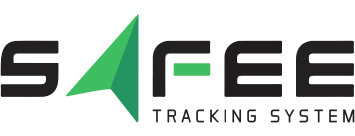Vehicles and Transportation Fleets Tracking Services
In this article, we talk about the crucial reasons for tracking companies’ transportation fleets of vehicles and large trucks, the various services which companies can obtain, in addition to the resulting technical and financial benefits from those services. After that, we conclude with a detailed explanation of how to provide these services and their requirements.
Some of the problems faced by the companies in tracking their vehicles and managing the fleet’s movements.
For everyone who owns a fleet of vehicles, regardless of its size, and has a number of drivers whom he hired to drive vehicles and carry out certain tasks for the benefit of his business, he faces challenges such as:
- Driver performance: Like any corporate employee, it is important for management to know and evaluate their employees’ work performance. Many companies suffer from controlling their drivers’ work in several ways, including driving hours, places and hours of rest, misuse of vehicles, entry to prohibited areas, etc. It also concerns the companies that certain drivers do not use certain vehicles without permission.It is also included in the field of evaluating drivers’ performance, achieving their tasks in time and place, and adhering to safety rules: speed limits, seat belts, long driving hours, night driving, etc. The companies also suffer from ambiguity in identifying the driver who committed a specific offense with regard to vehicles used by several drivers.
- Vehicle work hours: Many companies do not know exactly the level to which they use their vehicles and whether the fleet is less or more than the real needs of the business. Consequently, it is reflected in the operating costs and financial waste of not achieving the optimal usage percentage of the vehicles, because the manager cannot monitor all the details of the fleet movement and the occupancy rate, so he will not be able to determine the sufficiency of the fleet’s vehicles for the tasks assigned to them.
- Fuel consumption: Many transportation companies suffer from wasted fuel consumption, which is represented by either misusing the vehicle or leaving it idle while the engine runs for long periods.
- Overloading: Some vehicle drivers add extra loads to the main required shipment, either to reduce the number of their business trips or because they transport other goods using the same vehicle to collect financial interest that they are not entitled to. These cases cause damage to the vehicles’ health, the wear to the valuable parts, and shorten the length of periodic maintenance times.
- Maintenance: Regular maintenance is the focus of attention of all transportation companies, and it forms a large percentage of their operating expenses. These companies suffer from sudden malfunctioning and unexpected interruptions due to the inability to monitor and track vehicles’ health and drivers’ behavior. Fleet management systems provide integrated maintenance scheduling tools designed to facilitate the tracking of periodic checks and preparing early maintenance schedules.
- Traffic offenses: Some vehicles are exposed to a sudden technical investigation by the traffic patrols for violations, such as the expiration of some identification papers or the delay in the maintenance of some worn parts such as tires, windshield wipers, brakes, etc.
- Trips routing: When leaving the option to the drivers to choose the proper roads for the accomplishment of the trips’ goals, this might lead to the selection of non-optimal routes that result in driving farther distances or passing through unsafe places the fleet manager does not want his fleet to drive through.
- Work hours: The transport sector differs from other sectors in that drivers usually work according to transport duties and not according to specific working hours. This could lead to them working more hours to do their tasks. Managers do not have any indicator about this additional fatigue, which may be the cause of many traffic accidents, whose consequences are significant in terms of loss of lives and money.
- Geographical areas in which vehicles are located: The presence of vehicles within the places in which they are required to be present is essential to ensure the safety of workflow and the security of vehicles. Vehicle movement officials suffer from their lack of knowledge of this information, which leads to an imperfect assignment of movement tasks to the vehicles.
- Customer complaints: The last stage of goods delivery, or what is known as the “last mile”, is of great importance to companies in any supply chain, and this stage of delivery has the greatest impact on customers and on the business reputation of the company.
Retailers and manufacturers around the world agree that accuracy and adherence to delivery dates as well as sending real-time updates about shipments is one of the top priorities. Customers want to receive their shipments on time and with the least possible interruption in their daily operations, and to rise to the challenge of the increasing demands of customers, the pivotal role of fleet management solutions come to empower the companies to keep delivery costs low, train drivers and provide them with the necessary information to meet the expectations of their clients to complete deliveries safely on time and within budget. - Lost in remote areas: Companies working in the field of transportation and logistics face major difficulties in managing their daily operational efforts when they require carrying out long-range transport duties that extend over large geographical areas within the same country or across the borders with other countries, which may put the vehicles and valuable assets of the company in harsh circumstances and challenging environments.
Under critical conditions, when the proper coverage of mobile communications is not available, monitoring and tracking technologies will enable the fleet manager to communicate with vehicles and request their locations via satellite. Drivers will also be able to send the necessary emergency alerts under any circumstances and in the harshest environments to the company’s management office. - Fleet and driver safety: Maintaining safety procedures and ensuring they are applied in the businesses that rely on managing a large number of vehicles and assets on the roads and in the work fields are so crucial.
The fleet manager is primarily responsible for the safety of his employees and for keeping the vehicles on the road fully equipped with the best safety features.
Modern technologies of vehicle monitoring and fleet management help enhance safety and emphasize its importance within the work environment. It equips the fleet manager with an integrated system to manage risk and collect the necessary data to avoid accidents and comply with safety regulations. As well as making sure that drivers have the necessary skills to carry out the tasks assigned to them and seeking to train them regularly. You must have safe and responsible drivers on the road so as not to affect the safety of other road users. - Road safety: Public safety is a critical issue, especially for fleet drivers who frequently interact with the public and spend long periods of time on the highways, often in large transport trucks that pose additional risks to road safety. Therefore, establishing effective drivers’ educational programs and striving to spread a “safety first” culture is a matter of public responsibility.
Unsafe driving behaviors put the lives of everyone on the road at risk. Creating a safety culture depends first on identifying and correcting irresponsible driving behaviors and this is what the fleet management and vehicle tracking solutions will provide. - Fuel theft: Fuel costs are a major operational expense in transport and logistics fleets, and thus losing or stealing fuel forms a significant leakage of business expenses. It is critically important for the fleet manager to have the necessary systems and tools to ensure that the fleet does not pay more than it has to for one of the main operating expenses which is fuel. Fuel theft and unauthorized purchases hurt your business more than you might expect.
Fleet management software provides managers with the tools to control drivers’ commitment and keep operational costs to the minimum, implement plans to reduce theft, and activate an integrated system to reduce loss related to unauthorized fuel purchases. - Fleet status and performance: The larger the company, the more vehicles and assets it will need to use and manage. This increases the likelihood that some assets will be exposed to the risk of theft or not being operated to their full potential, both of which represent a major loss and a huge cost to the company that negatively affects the overall performance of the fleet.
Companies that rely on trucks and various vehicles to provide products and services to their customers can achieve tangible and direct financial benefits through GPS vehicle tracking systems. Fleet tracking solutions put you on the right track by ensuring that all fleet assets are fully utilized, reducing operational costs, and improving productivity. - Ruined cargoes: Transportation companies that deliver various foodstuffs are responsible for protecting public health by maintaining their loads at regular temperatures to preserve their freshness.
Wireless systems to monitor cargoes and trailers, with their asset monitoring sensors, play a pivotal role in maintaining the health of goods, while modern technologies of fleet management help managers do their jobs with confidence and provide them with accurate digital records to verify compliance with the related rules and regulations, ensuring that shipping companies avoid fines and reduce the number of missed trips and rejected deliveries.
Vehicle Tracking Services
The vehicle tracking sector includes many services, the importance of each service varies for fleet owners according to their business model. Here are the most common services:
- Live Monitoring: Live monitoring services and systems enable fleet managers to use the data from remote communication devices such as GPS trackers installed within vehicles, to obtain a comprehensive and integrated real-time view of vehicles’ locations, drivers’ behaviors, technical conditions of vehicles, and valuable assets on roads and various work fields.
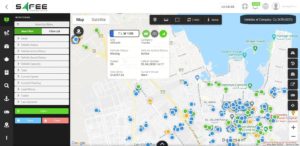
- Geofencing: Modern systems of fleet management provide the most important service in organizing administrative work and increasing productivity, which is the service of setting and planning geographical areas, or what is also known as “geofence”, that is a virtual perimeter surrounding the real-world geography.
Setting virtual boundaries across geographic areas is very beneficial for fleet managers for a number of reasons, such as managing a group of vehicles within a region to reduce the switching time between the different tasks to a minimum. When drivers are organized in specific areas, the response rates are shorter and the different areas are covered equally with the same quality of service. In addition, geofencing technologies are used to organize worksites and fields and categorize them by task, eliminating the need for manual sorting and categorization of thousands of mobile workforces in the field.
Reducing fleet operating costs begins with smart business planning and organizing, and that’s exactly what geofencing services provide.

- Alarms: This service provides fleet managers with the ability to receive real-time notifications related to the crucial information about vehicles’ locations, engine performance, and the situation of valuable assets, as well as drivers’ behaviors 24 hours per day, 7 days per week.
Maintenance: The maintenance planning services of the integrated fleet management systems, provide the necessary data to develop robust maintenance plans for the fleet trucks and vehicles and ensure the commitment to the periodic maintenance schedules. This helps keep both fleet vehicles and drivers safe on the road and increases engine lifetime, which in turn allows decreasing costs and making the company more profitable.
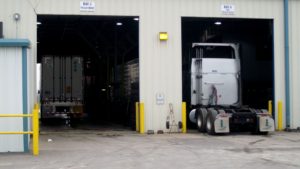
- Scheduled reports: Fleet monitoring technologies provide an array of features that help to shape the management strategy of your fleet and improve the efficiency of your workforce, through the vast capabilities of comprehensive, customizable reporting across the entire system and across your entire corporate hierarchy. This service also allows for accurate scheduling of reports with the ability to send them via email to the concerned supervisors and managers.
- Drivers: This service includes providing an integrated dashboard for evaluating drivers’ performance, in which the basic information on driver’s behavior is displayed in a clear and understandable way. Driver performance factors monitored with this powerful tool include kilometers traveled during working hours and during overtime hours, severe braking, extreme acceleration, over-speeding, idling times, and reports on seat belt usage.
- Sensors and accessories: This service includes the integration of the main GPS vehicle tracking platform with various additional sensors that may be added to the vehicles and trailers such as weight and temperature sensors, as well as accessories related to video surveillance and driver behavior recording. This service also provides the fleet manager with dashboards and full detailed reports of the data extracted from these sensors and accessories.
Journey management: This service helps in assigning predefined missions and trips to fleet vehicles. The fleet manager creates the mission and links it to a specific vehicle, and the system will continue to monitor that vehicle within the mission timeframe. The system checks whether the task has been achieved or not, and records relevant data that contribute to route planning processes and cargo delivery optimizing.
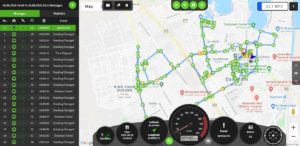
- Video IVMS: This service provides a comprehensive and integrated view of what exactly is happening on the roads and in the worksites, in order to maintain the safety of the fleet and control the security of operations.
Fleet managers and business owners will have tremendous video surveillance capabilities, both in and out fleet vehicles, to monitor drivers’ behavior and to help investigate causes and conditions prior to accidents.
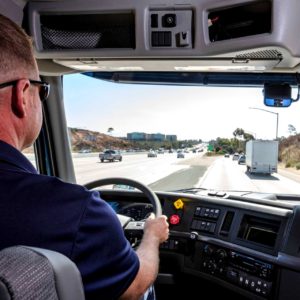
- Weight tracking: Weight tracking and axle load monitoring services are closely related to heavy haulage trucks, dump trucks, and mining vehicles, but they also serve public buses, light trucks, and service vehicles of the local councils of cities and countrysides.
The critical role of the axle load monitoring system is to help avoid faults, improve cargo loading operations, and stop the payment of overloading fines.
- Fuel consumption: The fuel consumption monitoring service provides dashboards and basic reports on fuel consumption across the entire fleet.
By integrating with the fuel card system, it can really make the difference to lower costs as the fleet manager will be able to check all fuel purchases in real-time, prevent misuse of fuel cards, and eliminate theft.

- Fleet performance: This service primarily provides tools to measure and monitor drivers’ behaviors and define key performance indicators KPIs with the goal of reducing the risk of reckless behavior, keeping the fleet profitable, and enhancing public safety.
When driving behaviors are improved and performance measures tuned, the benefits will emerge across the entire fleet, maintenance costs will decrease, the technical lifetime of vehicles will expand, and most importantly, customer satisfaction and loyalty will increase.
- Immobilization: This service allows remote control of fleet vehicles where the fleet manager will be able to prevent the vehicle from operating in cases of suspected theft or unauthorized use by the driver, providing enormous and vital benefits related to fleet safety and security issues.
Financial and Technical Benefits
Using vehicle tracking services brings a lot of financial and technical benefits to fleet owners. Such as:
- Setting working hours
- Monitor the performance of vehicles and drivers
- Prevent vehicle theft
- Saving in traffic fines
- Avoid traffic accidents
- Control maintenance operations
- Saving in fuel consumption
- Eliminate fuel thefts
- Saving in vehicle insurance costs
Steps to do to start using vehicle tracking services
- Determine the purpose of tracking your vehicles.
- Based on the target, you have the hardware, devices, and accessories that must be installed in your vehicles. For example, but not limited to:
- If the primary goal of tracking is to protect against theft of your vehicles, tracking devices that support immobilization should be chosen and this process should also be supported by the tracking software platform.
- If the goal is to monitor the vehicle’s weight and prevent excessive loading, weight sensors must be installed on the vehicle’s axles and connected to the tracking device. We will dedicate a separate article to this topic due to the large number of details related to it.
- If the goal is to monitor the use of fuel and prevent theft, then one must either rely on the CANbus or install external fuel sensors. The software tracking platform should provide services related to fuel consumption monitoring as well.
- Choose the appropriate internet service provider to subscribe to the internet service, such as 3G, 4G, etc. It should be noted that the comparison is not only financial but also depends on the size of the monthly package and whether the package is a shared set of all SIM cards or for each SIM card separately.
The decision depends on the amount of data you want to transfer from your vehicle, as well as on the frequency of messages you need from the close / medium / diverged monitoring of the vehicle. Close monitoring requires a message from the vehicle every 1 to 5 seconds and is used for vehicles carrying dangerous or expensive cargoes. Medium monitoring, which limits the messaging to every 20 to 40 seconds, this kind of monitoring is adopted by a lot of customers such as transportation and car rental companies. Diverged monitoring is around a messaging limit every 5 to 10 minutes and is used for slow-moving vehicles. According to each category, data consumption varies greatly, and accordingly, the price of the internet service provider differs. Important points to discuss with your internet service provider as well:- Service at the end of the package: Usually, internet service providers either stop the service or continue with it for amounts greater than the monthly subscription. The decision is based on the sensitivity of the business or the avoidance of unexpected expenses.
- Receive SMS messages: Customers sometimes need to send orders via text messages to the GPS tracker. Most service providers disable this service, and therefore you should inform them of the need for it or not.
- Choosing the tracking platform: There are many platforms and software services for vehicle tracking. The following are the most important points that should be taken into consideration when selecting the right tracking platform for your fleet:
- Subscription type: The fleet management service providers adopt the Software as a Service SaaS model to provide their customers with cloud services that they can access according to subscription plans on a monthly or annual basis. This type of subscription allows users to access the solution anywhere via their smartphones, laptops, desktops, and tablets.
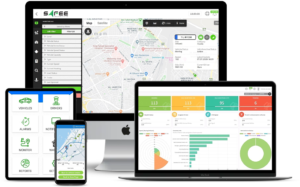
- Price: Subscription-based fleet management software solutions are priced for each user depending on the size of his company and his fleet requirements and this often also includes technical support and field implementation assistance.
The customer will only need to pay a monthly or annual subscription cost based on the number of vehicles, the number of user accounts on the platform, and the number of features the company needs, in addition to any extra services in terms of support and maintenance. The user should also consider that he will need to purchase or rent the required hardware devices, such as GPS tracking devices and any additional hardware accessories that may need to be installed in each vehicle. He should purchase SIM cards and pay internet subscription fees too.
- Web-based or need a specific application: Customers will not have to rely on the capabilities of their computers or their installed hardware. The Software as a Service SaaS is a cloud solution that is hosted on sophisticated and highly secure servers, and customers can access and benefit from its services directly over the internet through a web browser.
- Technical support: Fleet management software service providers have special teams to provide technical support to customers around the clock and during all days of the week, to answer customer questions and provide technical assistance, whether related to the use of the cloud software, or assistance in the installation and activation of the hardware within vehicles. Make sure to take advantage of this service and do not hesitate to contact the support team.
- Continuity: Cloud services are constantly updated on a regular basis and go through major improvements related to data security and secure access to them. Also, new features are implemented and tested regularly so they can be added to the cloud solution based on the future needs of the customers.
- Targeted customers: The fleet management software services aim to provide the necessary support to fleet managers and business owners of large corporations who are responsible for managing fleets with a huge number of vehicles. Cloud services also support the management of smaller fleets of mid-size companies and small businesses. Individual customers can also benefit from cloud platforms to monitor and track their own individual vehicles.

- Hosting: Cloud services are usually hosted on advanced and secure servers belonging to the company that provides the fleet management platform. However, there are some providers that offer extensive customization options that include implementing hosting on client servers

- Integration with trackers: When choosing the appropriate service to manage your fleet, a very important point should be checked, which is the ability of that cloud platform to integrate seamlessly with a large number of GPS trackers, which gives your business the flexibility in choosing the hardware and the vital ability to deal with various installation and setup methods of these devices in your vehicles.
- Integration with other systems: When choosing the right platform for monitoring and tracking your fleet, make sure that this service has the ability to easily integrate with the existing systems used by your company. You can also check if that service has a set of tools and integrations that are already integrated with the platform.
- Customizability: When comparing several fleet management software solutions, verify the ability of some platforms to offer basic features such as the ability to customize settings and control data access permissions, organize vehicles and users in a multi-level hierarchical structure, support multiple languages and several systems of measurement units … etc.
Why you should choose Safee platform to manage your fleet of vehicles
Safee platform features the best monthly and annual subscription plans among competitors in terms of cost. The platform offers subscription plans that are fully commensurate with the financial capabilities and commercial investment budgets of the broadest segment of the transportation and services sectors and a large number of other industries and businesses. Safee platform also provides a very powerful pricing system that allows large corporations, mid-size businesses, small businesses, as well as individual customers to benefit from the tremendous services provided by the platform at low prices commensurate with the business needs of each client.
With Safee, customers will not have to rely on the computing capabilities of their own computers, as Safee platform is an integrated cloud software that is hosted on very fast and secure servers, and customers can access it directly over the internet through the web browser on laptops, desktops, tablets, and smartphones.
The developer company of Safee platform has an expert team that is always ready to provide technical support to customers about using the cloud software and the installation and integration of the hardware in vehicles, around the clock, seven days a week. Safee fleet management software is characterized by being constantly and regularly subject to updates by a highly skilled team of developers specialized in cloud services, big data, and network security.
Safee GPS vehicle tracking service provider offers huge customization options, including the implementation of hosting on the client’s own servers. Safee provides seamless compatibility and integration with a very large number of GPS trackers from all manufacturers around the world. The platform also has tremendous integration capabilities with the technologies and systems that customers are currently investing in and using within their organizations. It is also possible to take advantage of the various services that already integrated with Safee fleet management platform such as “Wasl” service for managing compliance with regulations related to vehicle weight, “Orbcomm” for satellite communications, and “Streamax” video monitoring as well as many other services and platforms currently included in Safee’s marketplace of integrations.
Safee also offers a customizable alert feature where the customer can set the suitable conditions for triggering alarms and notifications about his fleet vehicles and determine exactly who will receive those notifications. Safee platform is characterized by strong customization capabilities that include customizing settings, data access rules, and data security levels in line with the organizational goals of the company and all business needs of the fleet activity.
To learn more about the capabilities of Safee platform, click here.
